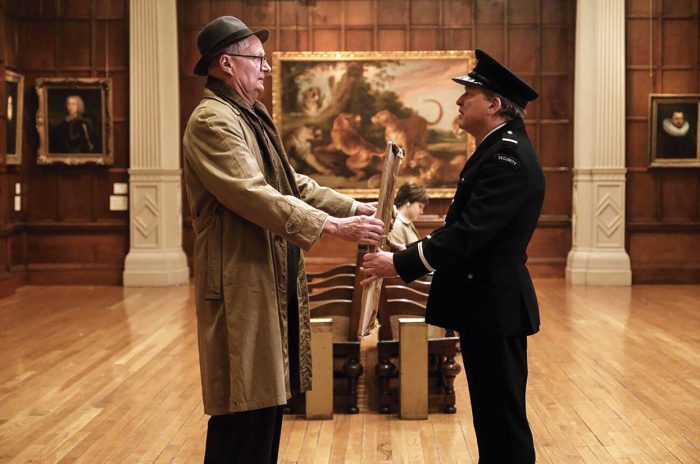Movie Review: ‘The Duke’ is an entertaining and touching film
Reviewed by Jeffrey Sanzel
In 1961, London’s National Gallery acquired Francisco de Goya’s early nineteenth century The Portrait of the Duke of Wellington. Valued at £140,000, the work was stolen on August 21, just nineteen days later. Falling into the “this is too far-fetched to be true,” the culprit was revealed as sixty-one-year-old Kempton Bunton, a taxi driver from Newcastle Upon Tyne (located in the northeast of England). Brought to life in The Duke, the film marks the final work of director Roger Michell (Notting Hill), who passed away in September 2021.
According to Bunton’s grandson, Chris, the screenplay takes very few liberties with the actual story and reflects his grandfather’s character—though the real Kempton was not as warm as his screen counterpart. Jim Broadbent fully inhabits Kempton Bunton, whose campaign against pensioners having to pay for a television license leads him to theft.
Two approaches could have been taken to tell this fascinating story. The first would have been a dark and serious exploration of the common man railing against the system (think auteur Mike Lee’s grittiness crossed with screenwriter Jack Rosenthal’s realism).

Or in contrast, the creators could have selected a more whimsical approach in the vein of the Ealing Studio comedies (those that featured character men such as Alec Guinness and Peter Sellers). Writers Richard Bean and Clive Coleman have opted for the latter, with the result being an engaging mix of old-fashioned caper with a sensitive and touching underpinning.
The film opens with Kempton on trial, then flashes back to his earlier tribulations, including a short stint in jail for using a T.V. without the necessary license. An eccentric of the first order, he writes and submits plays that are never produced. In addition, he chatters so much to his cab clients that he loses his job and eventually loses a later position in a bakery for calling out the boss for abusing a Pakistani worker.
His wife, Dorothy (flawlessly played by Helen Mirren), cleans house and babysits for a local councilor and his wife (Anna Maxwell Martin, finding depth and nobility in a small role). Dorothy finds her husband’s never-ending antics and quixotic crusades overwhelming and perpetually frustrating. A shadow separates the couple: the death of their eighteen-year-old daughter in a bicycle accident a dozen years earlier. Kempton battles for the greater good of humanity but is often oblivious to his wife’s pain.

Their adult children include a supportive, good son, Jackie (a likable Fionn Whitehead), who dreams of being a shipbuilder, and the prodigal, Kenny (a surprisingly likable quasi-hoodlum played by Jack Bandeira). Kenny, along with his recently separated girlfriend, Pammy (Charlotte Spencer, wonderfully amoral and ambivalent), is hiding out with his parents. Pammy’s discovery of the painting stashed behind a false backing in a wardrobe drives the latter part of the story.
The film is brisk and often funny, with shades of Blake Edwards at his best and most focused. Split screens, Mike Eley’s spot-on cinematography, and a jazzy score by George Fenton complete the 1960s feel.
Broadbent is in his element, whether trying to get petition signatures, struggling with his writing, going against a racist, or being delightfully honest when questioned in the dock. He easily nuances the performance without losing the broader comic strokes. His scenes with the always brilliant Mirren reveal a troubled but enduring marriage of two unlike but equal souls.
Matthew Goode (Downton Abbey’s Henry Talbot, Lady Mary’s second husband) charms as Kempton’s barrister, Jeremy Hutchinson, in turn bemused and delighted by his client.
While courtroom scenes can be predictable, Broadbent’s quirky, raw honesty creates a riveting and satisfying climax. Through the wit and clever banter, the message of “I am you, and you are me” resonates. The trial’s outcome, the family struggle, and a surprising revelation make a satisfying resolution to The Duke, an entertaining and touching film.
Rated R, the film is now playing in local theaters.







